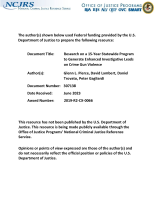Local government
Police Response to Special Populations
Columbia's Comprehensive Communities Program: A Case Study, 1998
Quiet Devolution: Thinking About the Roles of Police Middle Managers in Support of Community Policing
Report From the States on What Works at the State and Local Levels: A Compendium of Assessment and Evaluation Results
Effective Strategies for the Prosecution of Public Corruption, Final Report
Eight Successful City Drug Control Programs: Case Studies of Eight Prevention and Policing Programs
Assessment of Methods Used by State and Local Governments to Estimate Drug Abuse Levels: Summary
Issues in Contracting for the Private Operation of Prisons and Jails - Executive Summary
EASTSIDE SUBSTANCE ABUSE AWARENESS PROGRAM EVALUATION, 1993
NIJ School Safety Research and Evaluation
What We Have Learned
With approximately 100 studies completing in recent years, NIJ has sought to aggregate and disseminate findings from these studies. Some projects studied the root causes and consequences of school violence, while others evaluated innovative school safety strategies. This dissemination effort is intended to assess what we have learned, help...
Webinar Transcript: Fiscal Year 2024 Evaluating Strategies to Advance the Implementation of Evidence-Based Policies and Practices Solicitation
This webinar provided an overview of the NIJ FY 2024 Evaluating Strategies to Advance the Implementation of Evidence-Based Policies and Practices solicitation, in which...
The Great Experiment: California's Prison Realignment and the Legal Reform of Mass Incarceration
Inclusive Research: Engaging People Closest to the Issue Makes for Better Science & Greater Impact; 2023 NIJ Research Conference Plenary
This panel will discuss what inclusive research is, how to conduct it, and what issues and challenges exist about engaging in it. “Inclusive research” has its history as a participatory research method designed to ensure people closest to the issue or problem under study are authentically engaged in the research process rather than simply being “research subjects.” While community-based participatory research has begun to take on greater prominence in the criminal justice realm, such efforts are largely confined to qualitative research inquiries.
See the YouTube Terms of Service and Google Privacy Policy
2023 NIJ Research Conference Opening Ceremony
The theme of NIJ’s 2023 Research Conference was “evidence to action,” and our goal was to bring researchers and practitioners together to learn about the latest research evidence and how it can be implemented to promote safety, equity, and justice.
The opening ceremony included remarks from U.S. Attorney General Merrick B. Garland, Assistant Attorney General for the Office of Justice Programs Amy Solomon, and NIJ Director Nancy La Vigne.
See the YouTube Terms of Service and Google Privacy Policy
Data and Dashboards: Research and Enhancements to Ensure Mecklenburg County’s Criminal Justice System is a Leader in Data-Driven Decision Making
Research on a 15-Year Statewide Program to Generate Enhanced Investigative Leads on Crime Gun Violence
Tribal Crime, Justice, and Safety, Part 2
Stacy Lee Reynolds and Christine (Tina) Crossland continue their discussion of tribal crime, justice, and safety, including how Native American persons experience crime victimization at higher rates than non-Native people and the jurisdictional complexities in responding to tribal crime, justice, and safety. Read the transcript.
Listen to the first half of Stacy and Tina’s discussion.
Reading and Resources from NIJ
Tribal-Researcher Capacity Building Grants





